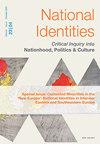Negotiating the Lebanese national imaginary on and beyond the screen: an intertextual perspective on the film adaptation Kahlil Gibran’s The Prophet
IF 0.7
Q3 POLITICAL SCIENCE
引用次数: 0
Abstract
ABSTRACTMost research on films as sites of nation-building centers on on-screen storylines, whereas intertextual references and off-screen representations of nationhood receive less attention. This article proposes a combined approach to further explore the nation-building potential of films, using as a case study the film adaptation Kahlil Gibran’s The Prophet. Through a close reading of the film in conjunction with its intertextual references and the filmmakers’ media interviews, the article explores the construction and negotiation of Lebanese nationhood and history under Ottoman rule. Special attention is paid to how the film’s production, funding, circulation and reception are related to nation-building.KEYWORDS: Banal nationalismfilmintertextualityKahlil Gibran’s The ProphetLebanese nationalismnation-building Disclosure statementNo potential conflict of interest was reported by the author(s).Notes1 The name ‘Rahbani Brothers’ refers to both Assi Rahbani (1923–1986) and Mansour Rahbani (1925–2009) who were Lebanese composers and dramatists, best known for their work with Fairuz, Assi’s wife.2 Maronite nationalism can mean so many things that a single definition is impossible. In pre-1920 Lebanon, Maronite nationalism referred to a political ideology that advocated the autonomy of Mount Lebanon as the homeland of Maronites. Following the creation of Greater Lebanon in 1920, this strand of nationalism came to be described as ‘political Maronitism’, a term used by the Druze leader Walid Jumblatt to describe Maronite elites’ attempts to achieve ‘domination of the Lebanese system’ (Sirriyeh, Citation1998, p. 56).3 After Gibran’s demise in 1931, the copyrights to his artistic and literary production were transferred to his hometown of Bsharri where the Gibran National Committee was established to manage the copyrights. It also runs the Gibran National Museum, which features exhibits of his works and drawings.Additional informationNotes on contributorsHisham M. AliHisham M. Ali is a research fellow at KU Leuven's Research Unit of Arabic Studies in Belgium. His research interests fall at the intersection of literature, translation, media, and nationalism in the Arab world.银幕内外黎巴嫩民族想象的谈判:电影改编纪伯伦《先知》的互文视角
【摘要】大多数关于电影作为国家建构场所的研究都集中在银幕上的故事情节上,而对国家身份的互文参考和银幕外表现的关注较少。本文以纪伯伦小说《先知》的电影改编为例,提出了一种综合方法来进一步探索电影的国家建设潜力。通过对影片的细读,结合影片的互文参考和电影制作人的媒体采访,本文探讨了奥斯曼统治下黎巴嫩国家和历史的建构和谈判。特别关注的是电影的制作、资金、流通和接受与国家建设的关系。关键词:平庸的民族主义、电影、互文性、纪伯伦的《先知》、黎巴嫩民族主义、国家建设披露声明、作者未报告潜在的利益冲突。注1“拉赫巴尼兄弟”这个名字指的是阿西·拉赫巴尼(1923-1986)和曼苏尔·拉赫巴尼(1925-2009),他们是黎巴嫩作曲家和剧作家,最著名的是他们与阿西的妻子费尔鲁兹的合作马龙派民族主义可以意味着很多东西,一个单一的定义是不可能的。在1920年前的黎巴嫩,马龙派民族主义指的是一种政治意识形态,主张黎巴嫩山作为马龙派教徒的家园自治。随着1920年大黎巴嫩的建立,这种民族主义被描述为“政治马龙派主义”,德鲁兹领袖瓦利德·朱布拉特用这个词来描述马龙派精英试图实现“对黎巴嫩体系的统治”(Sirriyeh, Citation1998,第56页)1931年纪伯伦去世后,他的艺术和文学作品的版权被转移到他的家乡Bsharri,在那里成立了纪伯伦国家委员会来管理版权。它还经营着纪伯伦国家博物馆,其中展出了他的作品和绘画。希沙姆·阿里(hisham M. Ali)是比利时鲁汶大学阿拉伯研究中心的研究员。他的研究兴趣集中在阿拉伯世界的文学、翻译、媒体和民族主义的交叉领域。
本文章由计算机程序翻译,如有差异,请以英文原文为准。
求助全文
约1分钟内获得全文
求助全文
来源期刊

NATIONAL IDENTITIES
POLITICAL SCIENCE-
CiteScore
1.70
自引率
0.00%
发文量
37
期刊介绍:
National Identities explores the formation and expression of national identity from antiquity to the present day. It examines the role in forging identity of cultural (language, architecture, music, gender, religion, the media, sport, encounters with "the other" etc.) and political (state forms, wars, boundaries) factors, by examining how these have been shaped and changed over time. The historical significance of "nation"in political and cultural terms is considered in relationship to other important and in some cases countervailing forms of identity such as religion, region, tribe or class. The focus is on identity, rather than on contingent political forms that may express it. The journal is not prescriptive or proscriptive in its approach.
 求助内容:
求助内容: 应助结果提醒方式:
应助结果提醒方式:


